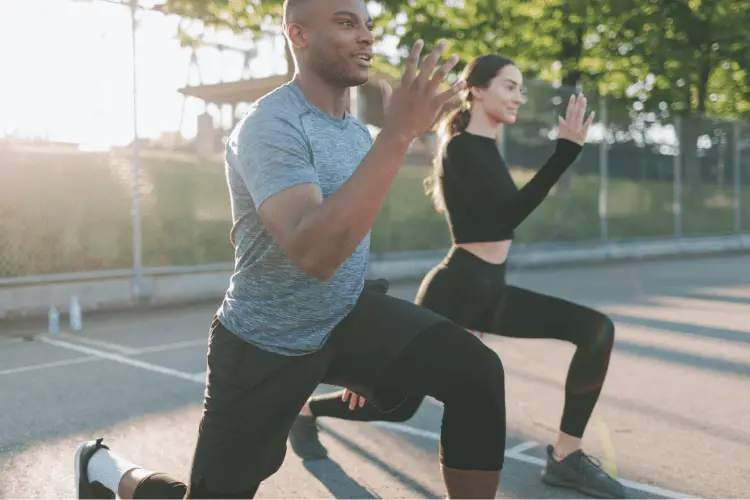Exercising may not be at the top of your to-do list when you’re feeling lethargic. After all, staying warm under the covers is far more enticing than breaking a sweat.
While I can certainly empathize, I’m here to tell you that exercise is absolutely one of the best ways to alleviate long-term exhaustion. It can help you feel energized and reduce stress levels, leading to healthier mental and physical health.
In this article, I’ll discuss the relationship between lethargy and lack of exercise. Does exercise fix lethargy? And does it really make you feel less tired in the long run?
Let’s find out!
Does Lack of Exercise Cause Fatigue?
Lack of exercise is one of the primary causes of fatigue. Without regular exercise, the body deconditions and undergoes numerous structural and metabolic changes. The body’s systems slow down, leading to a reduction of muscle mass, a drop in blood sugar, and poor blood circulation among others.
These changes occur when you go from a physically active state to a sedentary state.
Exercise has been proven to help reverse feelings of fatigue from all kinds of medical conditions, from depression to autoimmune diseases to cancer. It also increases energy levels and boosts endurance.
It streamlines the delivery of oxygen and nutrients through your body and helps the cardiovascular system work more efficiently. Moreover, it improves both heart and lung health, providing you with sufficient energy to tackle daily chores.
Without exercise, the complete opposite occurs. The heart doesn’t pump as much blood through the body, causing it to lose its ability to distribute blood flow effectively. The muscles would also lose their strength and start to weaken.
How Fast Will I Get Energy After I Start Exercising?
The answer to this question depends on several factors, including age, sex, physical health, and current activity levels. A tired mom of two in her 40s wouldn’t regain her energy as quickly as, say, a 17-year-old.
Generally, though, it can take between three to six weeks of regular activity to start feeling energized. In my experience as a personal trainer, these gains come in little doses. You’ll wake up one day and feel good and not notice it until later in the day when you think, “Man, I haven’t hit the snooze alarm in a week.”
The gains don’t come with trumpets blaring and the applause of the neighborhood. They are small, steady, and they start to add up in a very big way.
According to an experiment conducted at the University of Georgia, sedentary individuals reported a notable increase in energy levels after exercising three times a week for six weeks. By the end of the study, the exercise group experienced a 20% increase in energy levels and a 65% drop in feelings of fatigue.
Healthy adults need to engage in at least two and a half hours of moderate-intensity activity a week to reduce feelings of lethargy and increase energy levels. Such activities could be as simple as walking, gardening, or stretching.
If you’re using exercise as a time-out from stressors, you can get away with less exercise a week, especially if time or fatigue is a concern.
Break the exercise into two 10 to 15-minute sessions, one in the early morning and one at lunchtime during work, if possible. It sounds like nothing at first, but you’d be surprised how little exercise it takes to see a difference. Doing so can help you combat stress throughout the day.
How Does Exercise Boost Mood?
Exercise positively impacts both your mental and physical well-being. When you exercise, the body releases endorphins, which are “feel-good” chemicals produced in the central nervous system and pituitary gland. These endorphins not only promote pleasure but also alleviate pain, leaving you feeling euphoric after a particularly hard exercise.
Exercise also increases levels of dopamine, serotonin, and norepinephrine, which create a cycle of motivation, reward, and reinforcement. These chemicals boost energy and combat depressive episodes, resulting in better sleep, improved mental clarity, and less stress overall.
Because of its ability to improve and regulate neurotransmitter levels, exercise is often used to treat mild-to-moderate mental health disorders in place of medication.
For moderate-to-severe mental health disorders, exercise is used alongside medication and therapy as a supplement.

Exercise Combats Disease
The physical benefits of exercise are apparent from the get-go. It boosts the immune system’s ability to ward off disease, which in turn helps you get stronger and healthier. It also lowers the risk of muscle and bone injuries, as well as conditions like heart disease and diabetes.
Exercise can also prevent or manage health problems such as:
- Stroke
- Arthritis
- Osteoporosis
- High cholesterol
- Metabolic syndrome
- High blood pressure
- Bone fractures
- Cancers
It’s a well-known fact that physically active people outlive those who are inactive. It’s for this reason that regular physical activity, exercise, and fitness are deemed critically important for the well-being and health of people of all ages.
Everyone benefits from physical activity, even those who are frail and old as it can improve mobility and function.
And don’t forget that there may be a physical situation causing the lethargy. Get with a doctor to see what it is and look into it further and then ask how exercise might help. In my experience, exercise generally prevents and solves most physical problems.
Exercise Boosts Sexual Health
Exercise is also good for your sexual health. It can increase your confidence about your physical appearance, which can have a direct impact on your sex life.
Studies show that those who exercise have a more positive perception of themselves and feel that they’re more sexually desirable.
Moreover, it helps ensure a healthy circulatory system. Good circulation—i.e., a strong, smooth blood flow—is key for arousal. Healthy blood flow also reduces the risk of Erectile Dysfunction (ED) in men.
Exercise Helps Control Weight
Research has shown that weight loss through exercise can result in drastic improvements in mood. This is good news for those looking for ways to deal with the depression that often accompanies obesity.
Poor eating habits and excess body fat can increase inflammatory markers.
Exercise can also alleviate feelings of inadequacy associated with obesity. It can reduce levels of depression and anxiety, improve quality of life, and offer a more positive body image.
Exercise Helps With Sleep
Regular exercise can help you fall asleep faster and improve your sleep quality.
Physical activity increases time slept in deep sleep, the stage of sleep that leaves you feeling refreshed in the mornings.
It can also increase the duration of your nightly rest. Physical activity requires you to expend energy, leading you to feel more tired and ready to rest at the end of the day.
While exercise isn’t a cure-all for mood disorders, it’s proven to reduce feelings of stress and anxiety. It helps lower cortisol levels and reduces blood pressure, helping you fall asleep without your body fighting against you.
And, finally, exercise helps with insomnia and other sleep disorders.
Exercise is one of the most effective natural treatments for insomnia. It reduces the severity of obstructive sleep apnea and sleep-disordered breathing, helping patients get more restful sleep.
Restful sleep has positive outcomes on your daily mood. So if you find yourself feeling stressed or irritable due to lack of sleep, add a daily exercise routine to your schedule. After a good workout, you’ll notice the difference. There will also be further gains once you have been exercising regularly for a few weeks.
Why Do You Get More Energy When You Work Out?
Exercise increases your basal metabolic rate, giving you more energy to use.
Constantly requiring your body to get into motion forces your body to be able to use fat and carbohydrates/sugars for energy in a fast and efficient manner. Exercise helps the body metabolize energy by increasing the mitochondrial function in skeletal muscle. This means that the more you exercise, the more effectively you’ll turn food into energy.
Physical activity levels out your blood sugars, so instead of having fluctuations in energy, you have a steady stream. Have you ever known someone who just never gets tired? That can be you. I’ve personally worked with my clients in the gym who were the “lazy” ones of their family and completely turned it around.
Does Exercise Make You Feel Less Tired in the Long Run?
According to a study published in the Psychological Bulletin, regular exercise plays a consistent and significant role in reducing fatigue. So, yes, regular exercise does indeed make you feel less tired in the long run.

Exercise improves energy in a variety of ways:
1. Releases Feel-Good Endorphins
As discussed earlier, exercise releases “feel-good” chemicals that help reduce stress and pain, as well as trigger positive feelings. This happy state of mind can make you feel more energized and active during and after exercise.
2. Improve Sleep Quality
Burning energy through exercise can make you sleep better, which, in turn, gives you more energy to use the next day.
Exercise can mitigate symptoms of stress, anxiety, and depression through the release of endorphins, positively improving sleep quality. Without stress and anxiety weighing you down, you’re less likely to toss and turn for hours on end, contemplating everyday concerns.
But it doesn’t end there. Exercise raises your body’s core temperature, which then drops roughly 30 to 60 minutes after the workout. When done in the late afternoon or evening, this drop in temperature can help facilitate sleepiness.
3. Effectively Manage Stress
Over time, exercise can reduce the negative effects of stress. In this way, it acts as a stress relief. It imitates the effects of stress, such as the flight or flight response, and “trains” your body to work through those effects.
Being physically active improves the way the body manages stress because it alters the body’s hormone responses. In addition, it serves as a time-out or breaks from one’s stressors.
4. Strengthens the Heart
Extreme fatigue and lethargy are among the most common signs of heart issues. When the heart isn’t at its best, it won’t effectively pump blood and oxygen around the body. This is where exercise comes in.
Exercise is proven to have a positive effect on heart health, as it reduces blood pressure and wards off artery damage from high cholesterol. It also strengthens the heart muscle, allowing it to pump blood and oxygen more effectively.
While it can’t completely reverse heart disease, regular physical activity can help minimize symptoms through the improvement of blood circulation and heart function.
According to physiologist Dr. Kerry J. Stewart, resistance training and aerobic exercise are the key exercises for heart health.
Flexibility doesn’t directly contribute to the betterment of the heart, but it’s just as important. This is because flexibility provides a good foundation for effectively performing strength and aerobic exercises.
What Causes Lethargy?
To combat lethargy, you need to understand what causes it in the first place. Aside from lack of exercise, here are some of the most common causes of lethargy:
Unhealthy Eating Habits
Eating too many or too little of certain foods can make you feel sluggish. Skipping breakfast, eating too much junk food, and relying on caffeine to get through the day can seriously disrupt your energy levels.
To remedy this, ensure you’re eating the right amount of food at the right time. Eat plenty of iron-rich foods, such as lean beef, lima beans, whole grains, and dark green leafy vegetables to tackle issues like iron deficiency, which is one of the primary causes of lethargy.
Avoid foods loaded with sugar and simple carbohydrates and replace them with protein, whole grains, complex carbs, unprocessed foods, and fruits and veggies.
Not Drinking Enough Water

Even as little as 2% of normal fluid loss can take a massive toll on the body’s energy levels.
Dehydration reduces blood volume, making blood thicken. And when blood thickens, the heart pumps less efficiently. This causes less blood flow to vital organs like the brain, which can make you feel light-headed and lethargic.
As a general rule, you need to drink between 90 fluid ounces (11.5 cups) to 125 fluid ounces (15.5 cups) a day to keep yourself hydrated. This varies based on your environment, activity level, and whether or not you partake in vigorous exercise.
Conclusion
Exercise is one of the best ways to fix lethargy. It not only replenishes energy but also makes you stronger and helps you feel less stressed. You don’t even have to go all out with the exercise; if you’re currently doing nothing, a casual 15-minute walk in the evenings will do wonders for your physical and mental health.


